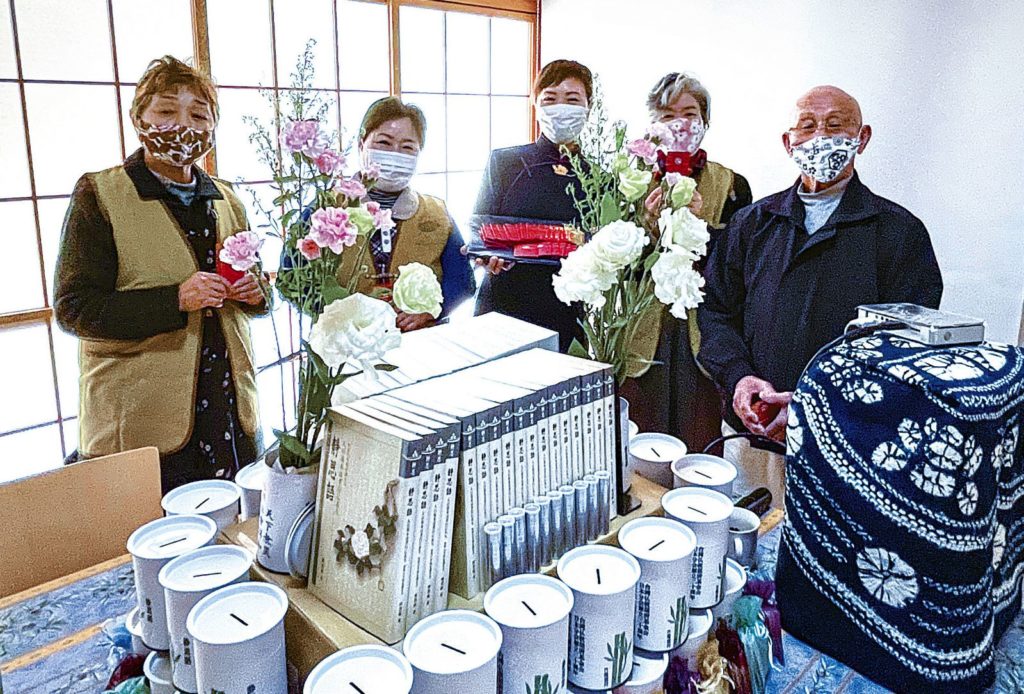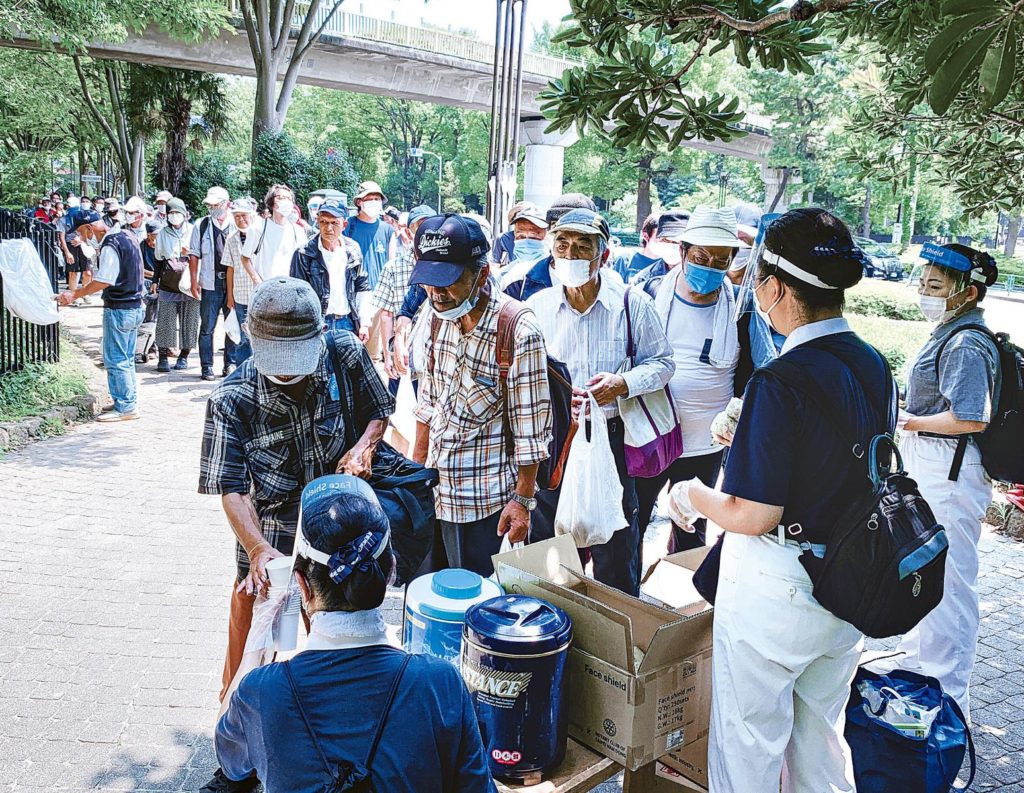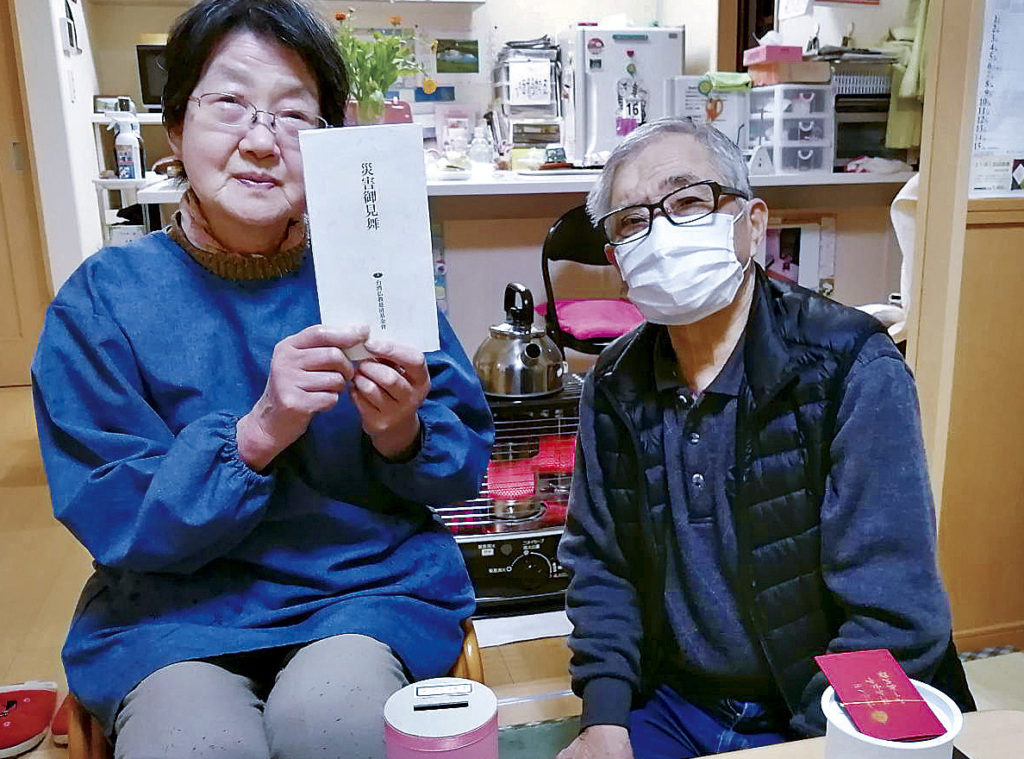Pooling Together Love for the Greater Good—Tzu Chi in Japan
By Xu Li-xiang (許麗香)
Abridged and translated by Wu Hsiao-ting (吳曉婷)
Pooling Together Love for the Greater Good—Tzu Chi in Japan
By Xu Li-xiang (許麗香)
Abridged and translated by
Wu Hsiao-ting (吳曉婷)

Volunteers in Japan launched a "500 coin banks" campaign this year to commemorate the tenth anniversary of the Great East Japan Earthquake. (Photo by Yang Xiu-wan)
Japan has a tradition of announcing its word of the year at the well-known Kiyomizu Temple in Kyoto at the end of every year. The word chosen for 2020 was "mitsu," meaning "close" or "dense." It was reflective of a new lifestyle borne of the coronavirus pandemic. Due to the raging virus, the Japanese government has urged people to avoid closed spaces, crowds, and close contacts.
The Japanese government has announced a state of emergency three times in response to COVID-19. The first was in April 2020, and the second was in January of this year. The second state of emergency was lifted in March, around the time the cherry blossoms were blooming. Not long after, Japan experienced a fourth wave of infections, forcing the government to declare its third state of emergency in late April.
We in Tzu Chi Japan have adjusted our charitable activities during the pandemic, according to the government's policies and the pandemic situation in the country. For example, volunteers in Tokyo have held meal distributions at Yoyogi Park for the homeless twice every month for 12 years. To avoid prolonged gatherings and reduce the chance of infection during the pandemic, volunteers decided to switch from dishing out hot food, such as curry rice, to distributing rice balls, fruit, and drinks. In addition, the number of volunteers serving on-site was cut down to as low as possible.
Another example is the meal distributions at a nighttime shelter for the homeless in the Nishinari District in Osaka. Volunteers there began providing rice and other ingredients for shelter workers to make into rice balls to give to the homeless. Though they took precautions to protect themselves and others, they strove to continue to help street people stay fed and warm.
Despite the pandemic, Tzu Chi Japan continued to receive requests from families to chant the Buddha's name to bless their departed loved ones. Volunteers did their best to satisfy such requests, but worried that they might disappoint the families. After all, the number of volunteers that could show up for the occasions had to be smaller than before. Fortunately, the families were all very understanding. They were moved and very grateful that the volunteers came out to them to help them during such a difficult time.
Coin Banks
This year marks the tenth anniversary of the Great East Japan Earthquake. In the aftermath of the 2011 world-shocking compound catastrophe, Tzu Chi volunteers across 39 nations and regions worked together to raise donations to help survivors rebuild their lives. Some survivors that received aid from the foundation became Tzu Chi volunteers themselves. To commemorate the anniversary and to thank Tzu Chi for helping them after the disaster, some survivors-turned-volunteers have made 500 coin banks and worked to enlist 500 people to adopt them. The people who adopt the coin banks could then use them to save money to help the underserved. In this way, the volunteers hoped to emulate the spirit of the Thousand-Hand Guan Yin Bodhisattva by combining the love and strength of 500 people.
As COVID-19 continued to escalate in Osaka, our volunteers there who were responsible for organizing distributions for local street people shared with our volunteers in Tokyo that the manager of the nighttime shelter for the homeless in the Nishinari District had joined Tzu Chi as a donating member. The manager had always allowed us to place coin banks on-site whenever we were distributing hot food at the shelter. Street people could then deposit their spare change into the banks, which would be used for charitable purposes. The manager had also designed posters encouraging the homeless to put their love into action by doing a good deed a day. Becoming a Tzu Chi donating member meant he would make regular monthly donations to the foundation.
Like their counterparts in Osaka, our volunteers in Tokyo placed coin banks on-site as a way to solicit love from street people whenever they were distributing food at Yoyogi Park. They shared with the homeless who came for the meals how small amounts of money, when pooled together, could be used to help many people. Our volunteers were always moved beyond measure whenever a street person ferreted out a coin from his dowdy clothes and put it into a bank.
When Tzu Chi Japan held major events in the past, such as the annual blessing and thanksgiving ceremonies, people always brought their coin banks to the event venues and donated the money inside. But no major events were allowed this year because of COVID-19. Instead, we arranged an online blessing and thanksgiving ceremony on January 31, during which volunteers from Tokyo, Osaka, Yamanashi, and northeast Japan met. In one part of the event, participants shook their coin banks to cheer each other on. It was a moving, emotional moment. Looking at the scene, I was touched but sad at the same time. I didn't know how much longer we had to wait before we could meet in person and freely give each other hugs and express care to each other instead of doing so virtually.

Tzu Chi volunteers in Japan have held meal distributions for the homeless twice every month at Yoyogi Park for 12 years. Due to the coronavirus pandemic, they switched from dishing out hot food to distributing rice balls, fruit, and drinks. (Photo by Wu Ci Juan)
Working for the Common Good
On account of the coronavirus, we can no longer take things for granted. Meeting in person is one of the things we can't take for granted anymore. I used to travel more than four times a year to Taiwan to visit Master Cheng Yen at the Jing Si Abode, the spiritual home of all Tzu Chi volunteers. But after the pandemic swept the world, it became so much more difficult to make such a trip. Even though nearly one and a half years have passed since COVID-19 broke out, visiting the Jing Si Abode still seems a distant reality.
Fortunately, we can still connect online; we can still meet the Master via videoconferencing and listen to her talk and expound the Dharma. On March 27, other Tzu Chi volunteers and I in Japan had a heartwarming online meeting with the Master. We reminisced during the meeting about the quake and tsunami that rocked Japan ten years ago, and survivors-turned-volunteers expressed their gratitude to the Master for the love Tzu Chi gave them after the compound disaster.
Shinnichi Ito was the first Tzu Chi volunteer in northeast Japan. Over the past decade, he has kept in close touch with our volunteers in Tokyo. He's also helped arrange the distribution of Tzu Chi scholarships in northeast Japan. He expressed remorse for having taken part in fewer volunteer activities since he suffered two serious bouts of illness. Seiichi Iwahana and his wife both became Tzu Chi volunteers after receiving cash aid from the foundation after the disaster. Serving as volunteers is their way of paying back. They have also helped organize the distribution of Tzu Chi scholarships for disadvantaged students. Zhang Jun (張君), originally from China, lost her daughter in the compound disaster. Master Cheng Yen's teachings and support from Tzu Chi volunteers helped her through that difficult time in her life. She is now a Tzu Chi commissioner, the first in northeast Japan. (A Tzu Chi commissioner must receive training and establish a roster of people who make monthly donations to the foundation.) With tears rolling down her cheeks, Zhang thanked the Master during the online meeting for creating Tzu Chi. She also pledged to do her best to carry out Tzu Chi work in northeast Japan and inspire more people to work together to serve people in need.
Chiyoshi Kameyama is good at calligraphy and painting. She and Zhang Jun have led volunteers in Ishinomaki and Higashimatsushima to carry out Tzu Chi missions. They have, for example, hit the streets to raise money for victims of Cyclone Idai in Africa. The two of them also came up with the idea of the "500 coin banks" campaign.
Japan was hit by the massive compound disaster just as Tzu Chi Japan was entering its third decade. Those of us in Japan are very grateful to the Master for helping calm our minds when the catastrophe happened and for guiding us in how to go about the relief work for the survivors. We are also greatly thankful to Tzu Chi volunteers across 39 countries and regions for launching fundraisers in their countries to help us provide relief to the disaster areas. Backed by the guidance of the Master and the love of Tzu Chi volunteers around the world, we will continue to do our best to solicit love in Japan and find more like-minded people to work together for the greater good.

Two survivors of the Great East Japan Earthquake pose with an envelope that contained the cash aid they received from Tzu Chi ten years ago. They have joined the "500 coin banks" campaign and will save money in the coin banks they received from Tzu Chi to help the needy. (Photo by Zhang Jun)
Going Strong
In 1998, eight years after the Tzu Chi Japan chapter came into existence, I returned to Japan with my husband, whose work had once again brought us to the country. At the time, the local Tzu Chi office was in an apartment provided by senior volunteer Song Du-zhi (宋篤志). The apartment was small, as was our chapter: we had just ten commissioners. Though we were a small branch, the atmosphere was very warm. I had at the time just received my certification as a commissioner in Taiwan. Buoyed by the fresh commitment I had made to emulate the Buddha's heart and carry out the Master's missions as my own, my mind was focused on how to extend the Master's compassion in Japan and make Tzu Chi known to more people there.
I expected my husband and I to stay in Japan for five or six years before his job took us away again. Little did I know that we would still be here after so many years, or that I'd get to see Tzu Chi Japan grow from its humble beginnings to what it is today. We have had a lot of laughter and tears along the way; we've experienced sadness and happiness. But as I reflect on all the years that have gone by, I find I no longer remember what caused me to shed tears. Perhaps I've purposefully tried to forget the sad parts or perhaps I've become wiser, but what I remember the most is how other volunteers and I have laughed together, how we have shared many joyful moments of positivity.
This year marked the 30th anniversary of Tzu Chi Japan. I've been with the branch for 23 years now. My love for the foundation is as strong as ever, my commitment just as firm. Never a day goes by without my doing Tzu Chi work. The Master's determination to relieve the suffering in the world inspired me to follow her. My desire to do charity work and benefit the world led me to join Tzu Chi, but little did I expect that I'd learn so much from the Buddha's teachings. The Enlightened One taught us the Four Noble Truths: "suffering, the cause of suffering, the end of suffering, and the path to freedom from suffering." He also gave us the Six Paramitas (Perfections) to practice on our path of spiritual cultivation: giving, moral discipline, patient endurance, diligence, meditation, and wisdom. Such teachings are important as we go among people to give, because working in this world is not easy. Setbacks and challenges are inevitable. It's through practicing the Six Perfections that we can endure challenging conditions, stay focused, and steadfastly continue our work without our attention being diverted from what really matters.
Tzu Chi has entered its 55th year. There have been numerous challenges along the way. The Master has often reminded us not to forget the aspirations that set us on the Bodhisattva Path. She tells us that love requires action. In the depths of the night, I often ask myself: "Is my love missing a piece? Is my love complete? Have I stayed true to the Buddha's and the Master's teachings?" Even though we are thousands of kilometers from our spiritual home in Hualien, eastern Taiwan, I will continue to foster unity among local volunteers and pool together their love to serve hurting and needy people. When we take one meaningful, fulfilling step after another, when we continue to grow in wisdom on the path we've chosen, then we are taking the Master's teachings to heart and easing her burden.
Contact Us | Plan a Visit | Donate
8 Lide Road, Beitou 11259, Taipei, Taiwan
886-2-2898-9999
005741@daaitv.com
©Tzu Chi Culture and Communication Foundation
All rights reserved.
